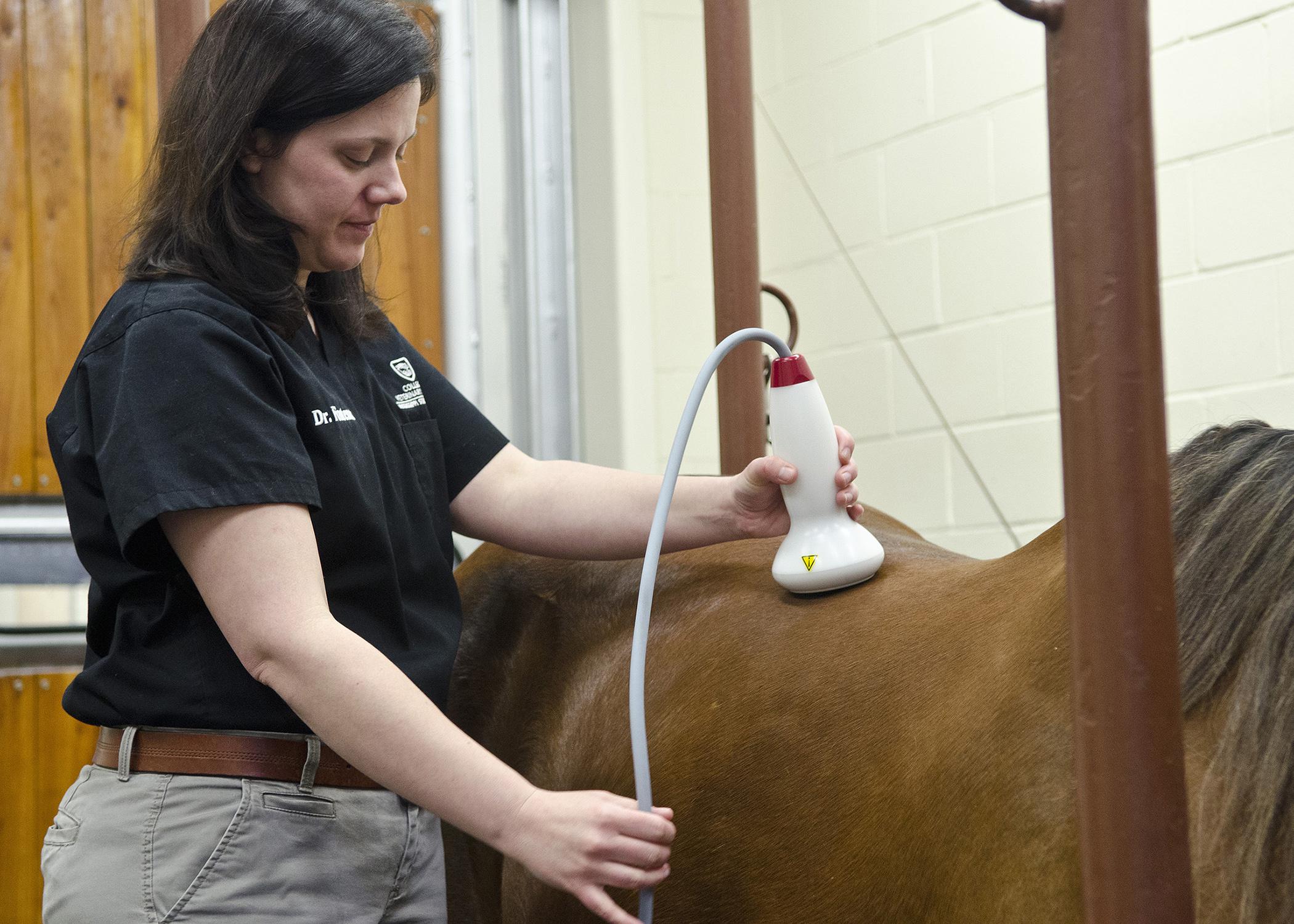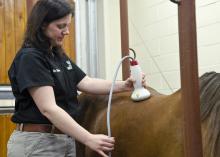Information Possibly Outdated
The information presented on this page was originally released on April 7, 2015. It may not be outdated, but please search our site for more current information. If you plan to quote or reference this information in a publication, please check with the Extension specialist or author before proceeding.
MSU-CVM offers new therapy for horses
By Jenny Burns
MSU College of Veterinary Medicine
STARKVILLE, Miss. -- Horse owners across the Southeast can benefit from a new service offered by the Mississippi State University College of Veterinary Medicine.
The technology known as “extracorporeal,” or outside of the body, shock-wave therapy has been available at the college since December 2014. This noninvasive treatment can stimulate healing in both new and old injuries to horses.
The therapy is used to control pain, to promote wound healing, and to treat tendonitis, insertional desmopathy, back pain, foot lameness, stress fractures and nonunions, and osteoarthritis and degenerative joint disease.
“Shock-wave treatment is administered by introducing a focused, high-energy sound wave through tissues using a shock wave probe,” said Dr. Robin Fontenot, MSU-CVM assistant clinical professor and board-certified equine surgeon.
MSU-CVM uses VersaTron electrohydraulic technology to deliver the therapy using one of four probes, depending on the location and depth of the injury. Due to noise associated with the therapy, veterinarians may administer a mild sedative to the patient before treatment.
“The therapy works by administering a shock wave that results in an increase of pressure in the targeted tissue. The pressure changes create increased blood flow and new blood vessel formation at the specific area of treatment,” Fontenot said. “This increased blood supply is an important part of healing.”
Extracorporeal shock-wave therapy can be used along with other therapies, and it is often part of a multimodal treatment plan. Fontenot said that while the service is relatively new to MSU-CVM, clinicians have already used the technology to treat soft tissue stifle injuries as part of a multitherapy plan.
According to Fontenot, the therapy also is used to treat back pain, navicular syndrome, and tendon and ligament injuries in horses. Both muscle- and spine-related back pain can be treated with the therapy. In some cases, the addition of shock-wave therapy can increase the effectiveness of other treatments and reduce their number and frequency.
Shock-wave therapy also aids in the treatment of many small-animal injuries. Dr. Ryan Butler, assistant MSU-CVM professor and board-certified small-animal surgeon, said the therapy can be used to treat a variety of conditions in small animals.
“The main indications are for treatment of osteoarthritis and ligament and tendon injuries. Other potential uses include treatment of delayed fracture unions, superficial wounds and various back conditions,” Butler said. “Anticipated results may be seen in both horses and small animals within one to three treatments.”
Dr. Andrew Mackin, interim head of the CVM Department of Clinical Sciences, said shock-wave therapy has been a welcome addition to the college’s Animal Health Center.
“We are excited and proud to offer this new technology for our patients,” Mackin said. “We recognize that treatment of orthopedic conditions often involves a combination of multiple treatment approaches, and the new shock-wave unit adds one more important tool.”
Mackin said the MSU College of Veterinary Medicine is committed to offering the very best that is available in new and innovative treatments.
“The most important tool in our toolbox, however, continues to be the advanced training and expertise offered by the skilled equine and small-animal surgeons on our faculty, who can identify the very best uses for this equipment in the patients under their care,” he said.
Veterinary students have also benefited from the addition of the service.
“Students get exposure to the technology through the equine rotation as part of their training,” Fontenot said. “It is somewhat dependent on the cases coming in, but we try to make sure that each rotation coming in gets exposure to the technology. In many cases, students can help administer the treatments.”
With virtually limitless applications for the technology, some animal owners may have a difficult time assessing whether shock-wave therapy would be beneficial to their livestock or pets. Owners with questions about the therapy should call the MSU-CVM Animal Health Center at 662-325-1351 to help determine if it is right for their animals.
Contact: Karen Templeton, 662-325-1100





